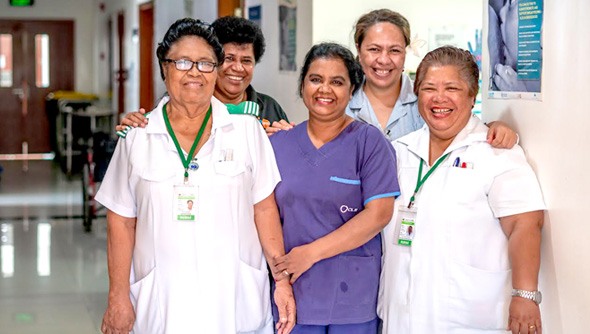Midwives are often called “unsung heroes” for the enormous part they play in saving lives, improving people’s health, and helping families thrive. International Day of the Midwife, celebrated globally on 5 May each year, is a reminder of the difference that midwives make behind the scenes to make our world a better place.
In working closely with women and families, midwives provide support and care during pregnancy, labour and birth, and once the baby is born. They also empower women and adolescent girls by providing them information and services on sexual and reproductive health including family planning.
Samoa is a good example of a country where midwives play a crucial role. Around 27 per cent of women have an unmet need for family planning—that is, she wants to delay pregnancy or does not want to get pregnant but is not using any contraception.
Moreover, the rate of adolescent girls aged 15 to 19 years giving birth in Samoa is 55 births per 1000 girls. This is important, because when a girl becomes pregnant, her health is endangered, her education and job prospects are damaged, and she becomes more vulnerable to poverty and exclusion.
These numbers, especially in the context of the extraordinary challenges the world is currently facing—including the health and economic crises resulting from the COVID-19 pandemic, impacts of climate change, and, in the case of small island states such as Samoa, the additional threat of natural disasters—underscore the need for investing in health and well-being through midwives.
One very simple step promises far-reaching positive impacts: improving education and skills for midwives.
The midwifery curricula review project
Midwives can make a significant contribution to improving sexual, reproductive, maternal, and newborn health and reducing maternal and newborn mortality, but only if they are adequately educated and trained. In fact, studies show that when midwives are trained to international standards, including on family planning, more than 80 per cent of maternal and newborn deaths could be prevented.
The United Nations Population Fund (UNFPA)—the United Nations sexual and reproductive health agency—recognizes the positive impact of high-quality midwifery care on the sexual and reproductive health of women and families across the globe. UNFPA is working with the government of Samoa towards educating and empowering a new generation of midwives under the Transformative Agenda (TA) programme. The TA, funded by the Australian Government, aims to reduce unmet need for family planning through various interventions, one of which is by revising and updating the national midwifery curricula in several Pacific countries.
In Samoa, UNFPA has been working with the Ministry of Health, School of Nursing of the National University of Samoa, Samoa Nurses Association and Samoa Family Health Association, with technical assistance from the Burnet Institute, to review and upgrade the National Midwifery Curriculum. The goal is to make sure it meets global standards on family planning, adolescent sexual and reproductive health, the needs of persons with disabilities and addressing violence against women. Graduates of the revised curriculum will have the knowledge, skills and attitudes required to work effectively as midwives thus reducing maternal and newborn mortality, and improving the health and wellbeing of women, families and communities.
The wider impact of safe and effective midwifery
The effects of quality midwifery extend beyond maternal and child health. Evidence shows that beyond preventing maternal and newborn deaths, quality midwifery care improves over 50 other health-related outcomes, including in sexual and reproductive health and immunization. As countries around the world work towards the Sustainable Development Goals (SDGs)—a set of 17 goals for a more sustainable future for all to be achieved by 2030—a common focus is health. Without healthy populations, economies cannot be productive and thrive.
A strong and qualified cohort of midwives will help Samoa achieve the SDGs, towards a healthier and more prosperous economy.
